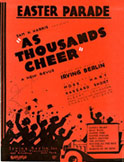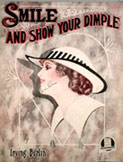As a small Easter egg for the Cladrite Radio community, we thought we’d offer the following:
 Did you know that the lovely Irving Berlin standard “Easter Parade” is a reworking of an earlier Berlin tune? It’s true. In 1917, Berlin wrote a song called “Smile and Show Your Dimple.” It was recorded by Sam Ash, recording artist and Broadway star (he also played dozens of bit parts in pictures), but that recording didn’t catch on with the public, so in 1933, when creating the score for the Broadway musical revue “As Thousands Cheer,” Berlin revisited the song, composing new lyrics and tweaking the melody a bit to create the song that is still so well known today.
Did you know that the lovely Irving Berlin standard “Easter Parade” is a reworking of an earlier Berlin tune? It’s true. In 1917, Berlin wrote a song called “Smile and Show Your Dimple.” It was recorded by Sam Ash, recording artist and Broadway star (he also played dozens of bit parts in pictures), but that recording didn’t catch on with the public, so in 1933, when creating the score for the Broadway musical revue “As Thousands Cheer,” Berlin revisited the song, composing new lyrics and tweaking the melody a bit to create the song that is still so well known today.
 Just as a bit of trivia, “Easter Parade” was introduced in “As Thousands Cheer” by Marilyn Miller and Clifton Webb.
Just as a bit of trivia, “Easter Parade” was introduced in “As Thousands Cheer” by Marilyn Miller and Clifton Webb.
So we’re sharing a 1933 recording below of Webb singing the song backed by the Leo Reisman Orchestra, along with a 1942 Harry James rendition, a 1939 recording by the Guy Lombardo and His Royal Canadians, Bing Crosby singing the song backed by the Victor Young Orchestra in 1948, a Gene Austin recording from 1933, and Sam Ash‘s 1918 recording of the song that fostered “Easter Parade,” “Smile and Show Your Dimple.”
“Easter Parade” — Clifton Webb with the Leo Reisman Orchestra
“Easter Parade” — Harry James and His Orchestra
“Easter Parade” — Guy Lombardo and His Orchestra
“Easter Parade” — Bing Crosby with the Victor Young Orchestra



